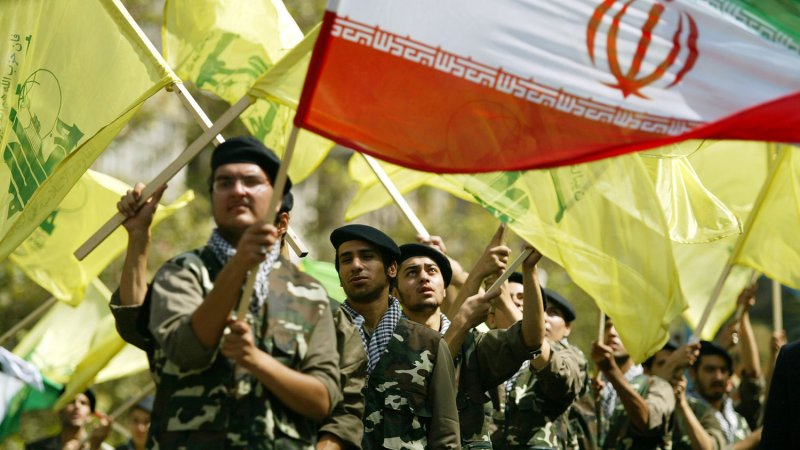Members of the Basij volunteer militia established by revolutionary leader Ayatollah Khomeini wave Hezbollah and Iran's national flags as they attend a rally on Al-Quds day (Jerusalem Day) in Tehran, Iran on September 27, 2008. (UPI Photo/Mohammad Kheirkhah) |
License Photo
NICOSIA, Cyprus, July 16 (UPI) -- The arrest in Cyprus of a suspected agent of Hezbollah, Iran's deadly Arab proxy, for allegedly planning bomb attacks on Israeli targets widens the scope of an Iranian offensive against the Jewish state amid growing tensions in the Persian Gulf.
The Greek Cypriot sector of Cyprus, like its mentor Greece, is moving increasingly closer to Israel as they work on a program to develop major natural gas fields under the eastern Mediterranean.
On July 7, Cypriot security authorities arrested a 24-year-old Lebanese man, in the southern port city of Limassol, where there is a large Arab community, two days after he flew there carrying a Swedish passport.
Justice Minister Loucas Louca declined to disclose details while an investigation was under way but Greek Cypriot newspapers said the suspect was seized after tips from foreign intelligence services.
The Phileleftheros daily said the suspect was involved in plotting to blow up an aircraft or a bus. Details of Israeli airliners were allegedly found on the suspect when he was seized but U.S. and British interests were also seen as likely targets.
Israel's foreign intelligence service, the Mossad, has acknowledged it was involved in the operation but has given no details.
Israeli Prime Minister Binyamin Netanyahu Sunday accused Hezbollah and its patron, Iran, for plotting attacks on the Jewish state.
Iran, he said, was the instigator.
"This terror is conducted under Iran's auspices. It's part of the Iranian plan," Netanyahu said.
The Cypriot plot was the latest in a growing string of alleged terrorist conspiracies in a half-dozen countries that apparently involved Iran's Ministry of Information and Security, the elite Al-Quds Force of the Revolutionary Guard Corps, or Hezbollah's special operations unit based in Beirut.
The plots, uncovered over several months, indicate Tehran's stepping up its "cold war" intelligence battle with Israel, apparently in retaliation for the assassination of four Iranian nuclear scientists, and an attempt to kill a fifth, since 2007.
There have been reports that the Israelis, along with the Americans, were using agents of the Mujahedin-e Khalq, the main Iranian rebel group active against Iran's clerical regime, for these operations.
But a new book by Yossi Melman and Dan Raviv, two Israeli journalists who're close to Israel's intelligence establishment, says the assassinations, and presumably other black operations conducted in Iran, were the work of Mossad agents.
Hezbollah has its own reasons for attacking Israel. It holds the Mossad responsible for the bomb assassination of its iconic military chief, Imad Mughniyeh in Damascus, Syria's capital, Feb, 12, 2008.
The Israelis say they've thwarted several Hezbollah attacks in the Middle East and Europe that were deemed attempts to avenge Mughniyeh, who before Osama bin Laden came along in the late 1990s was the most wanted terrorist fugitive.
Meantime, there have been several attacks, some of them thwarted, in Kenya, Azerbaijan, India, Georgia and Thailand in recent months. These were all seen as joint Iranian-Hezbollah operations.
New Delhi says at least 10 Iranians were identified in the Indian operation that was funded by money transfers from Tehran. Several Iranians, believed to Al Quds Force operatives, have been arrested.
The Kenya operation was thwarted June 19, when two Iranians, Ahmad Abolfathi Mohammad and Sayyed Mansour Mousavi, were seized in Nairobi and led security authorities to a cache of 33 pounds of RDX, a powerful military-grade explosive, in the port city of Mombasa.
Security officials in the East African country say the cache was only part of a shipment of 220 pounds of RDX smuggled into Kenya. The rest of the explosives have not been recovered, so other plots may be afoot.
Kenya, like Cyprus, is a favorite vacation destination for Israelis. Several resorts on Kenya's Indian Ocean coast are owned by Israelis. They were targeted Nov. 28, 2002, by al-Qaida. Twelve Kenyans and three Israeli were killed in a suicide bombing at the Israeli-owned Paradise Hotel in Mombasa.
Almost simultaneously, two surface-to-air missiles were fired at an Israeli Boeing 757 airliner carrying 250 Israeli holidaymakers home shortly after take-off from Mombasa airport. Both missed.
In the last few years, Iran's intelligence services have become active in Africa.
In October 2010, Nigerian authorities intercepted an illegal shipment of weapons in 13 containers at Lagos port on Africa's Atlantic coast that the Revolutionary Guards apparently were sending to rebels in nearby Senegal.





